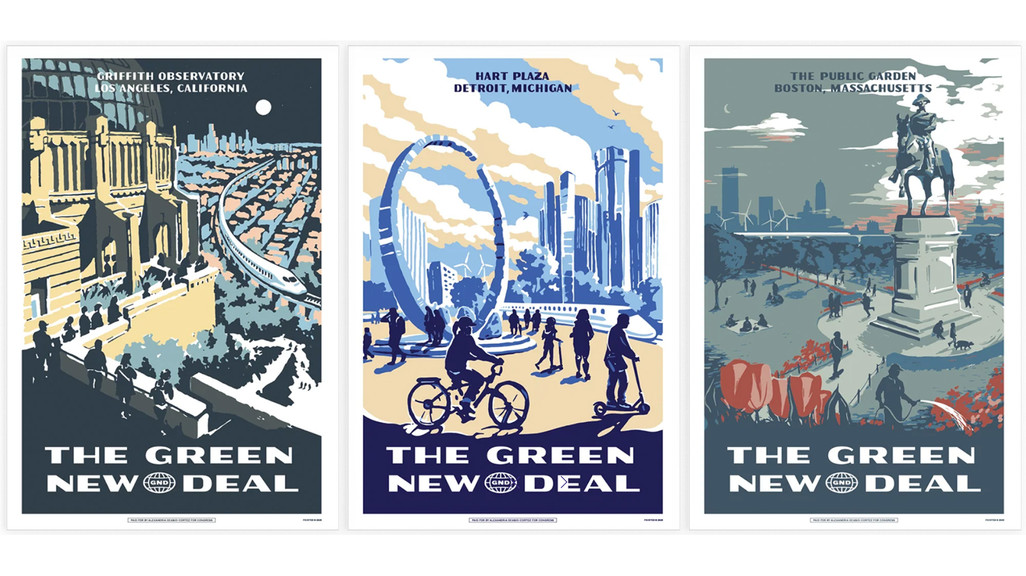
Fall 2023 Conference: "Architecture After the Green New Deal"
November 3 – November 4, 2023
UCLA Architecture and Urban Design (AUD) is pleased to convene the Fall 2023 "Architecture After the Green New Deal" conference, taking place in Perloff Hall Decafe on Friday, November 3 and Saturday, November 4, 2023. A full schedule appears below.
Please register in advance for the conference. You may reach out to the event organizers, AUD's Shota Vashakmadze (svashakmadze@ucla.edu) and Dexter Walcott (dwalcott@ucla.edu), with any questions or requests. Livestream will be available via Zoom.
This two-day event is part of the ongoing research initiative "Architecture After the Green New Deal," exploring climate change and the built environment. The effort aims to build upon AUD’s existing interest and enthusiasm for these issues, and to develop critical aspects of the strategic plan formulated by the School of the Arts and Architecture, as well as UCLA’s wider strategic planning, in response to the climate crisis.
The "Architecture After the Green New Deal" conference will include workshops for students and faculty as well as structured opportunities to engage with urgent questions. The two-day event will take place in Perloff DeCafe and in Perloff Courtyard, and will be live-streamed for remote viewing.
The Green New Deal framework has offered a transformative vision of large-scale climate action, describing an equitable future to be won through a democratized economy and a renewed built environment. Examining the practices and products of architecture, this two-day conference will reflect on the potentials of the profession five years after the initial proposal of the Green New Deal and imagine the possible futures of an architecture after the implementation of its equitable climate policies.
Looking beyond the merely technical solutions that have often characterized designers’ climate response, the conference will address the social and political challenges posed by the climate crisis. It will ask how architects should approach changing ideas of environment, how they can participate in political transformation, and how their built works might contribute to a just transition.
Conference panelists will examine the infrastructures of climate justice and their attendant architectural expressions. These overlap in scales and contexts, but will articulate distinct modes of practice through particular sites of design, including:
Building: The sequence will begin with a panel closely focusing on real—and immediately accessible—problems of design. It will identify contexts like the housing crisis, retrofitting, and energy infrastructure to identify the forces that shape architectural outcomes, suggesting ways in which designers can intervene.
Policy: The panel will identify policy as a determinative influence on architectural responses to climate change and a site of design practice in itself. It will consider the process of organizing, crafting, and realizing legislation, and frame its architectural manifestation as evidence of a broader socio-political context.
Pedagogy: The final panel will reassemble the issues of the conference with respect to developing a new pedagogy—architectural but also public-facing. The session will seek to connect an emerging public sensibility around a just transition to the long-term demands of a design education.
Our Schedule
Friday, November 3
9:00 am: Welcome, Morning Snacks, and Coffee
9:30 am: Introduction from AUD Chair, Mariana Ibañez
9:50 am: Panel 1: Building - Opening Remarks by Cristóbal Amunátegui
10:00 am: Panel 1: Building - Presentations by:
- Holly Jean Buck (SUNY Buffalo)
- Matt Huber (Syracuse University)
- Steph Carlisle (University of Washington)
11:00 am: Panel 1: Building - Discussion and Q&A, moderated by Cristóbal Amunátegui
12:00 pm: Break for lunch
1:20 pm: Panel 2: Policy - Opening Remarks by Dana Cuff
1:30 pm: Panel 2: Policy - Presentations by:
- Sydney Ghazarian (Labor Network for Sustainability)
- Raphael Sperry (Arup)
- Regan Patterson (UCLA)
2:30 pm: Panel 2: Policy - Discussion and Q&A, moderated by Dana Cuff
3:30 pm: Afternoon Coffee
3:50 pm: Panel 3: Pedagogy - Opening Remarks by Shota Vashakmadze
4:00 pm: Panel 3 : Pedagogy - Presentations by:
- Kate Wagner (The Nation)
- J. Mijin Cha (UC Santa Cruz)
- Eric Rauchway (UC Davis)
- Kian Goh (UCLA)
5:00 pm: Panel 3: Pedagogy - Discussion and Q&A, moderated by Michael Osman
6:15 pm: Closing Remarks for Day 1
Saturday, November 4th:
9:00 am: Introductions and Breakfast
10:00 am: Working Group Sessions:
- Architectural Practice, Technology, and Climate
- Public Goods and Public Infrastructure
- Organizing for a Green New Deal
- Theories of Climate Justice
- Architectural Criticism for a Just Transition
11:30 am: Regroup for Reportbacks, Discussion, and Q&A
12:30 pm: Wrap Up and Next Steps
1:00: Adjourn
This November 2023 conference follows the October 6, 2023 "Architecture After the Green New Deal" workshop, featuring Iñaki Ábalos and Renata Sentkiewicz as well as AUD's Cristóbal Amunátegui.
Related Faculty |
Cristóbal Amunátegui |